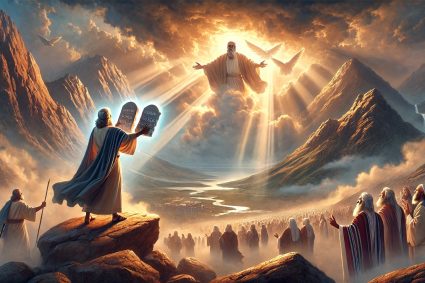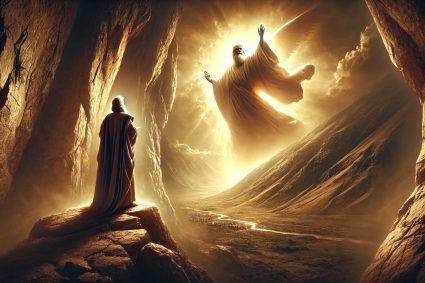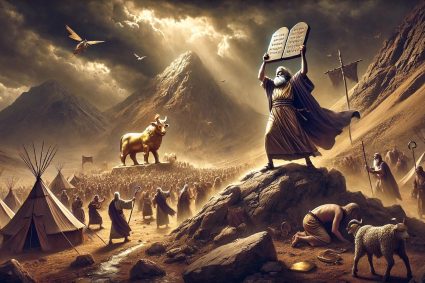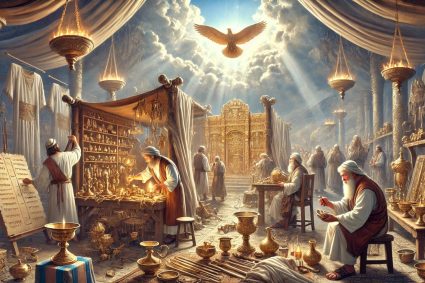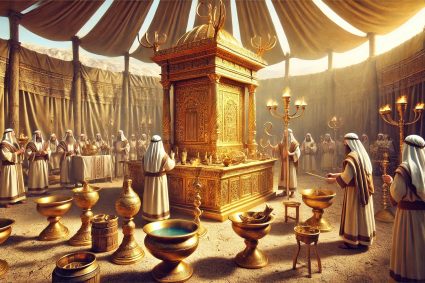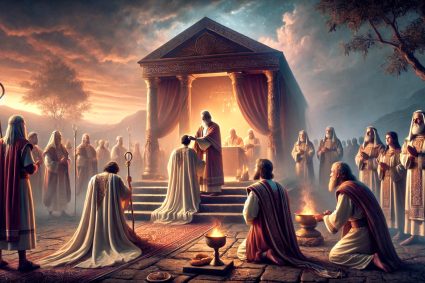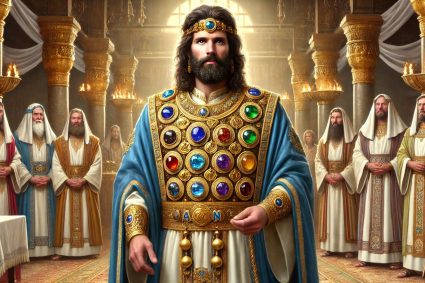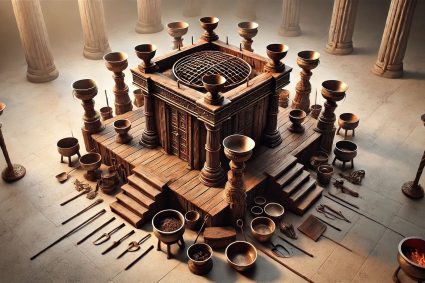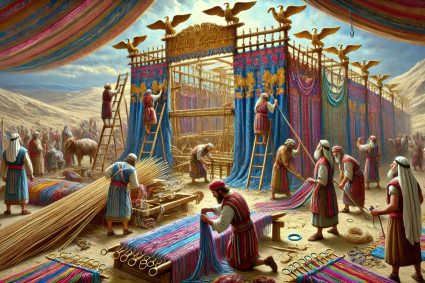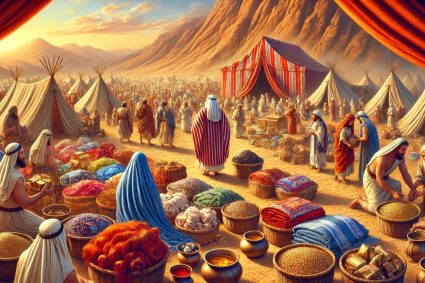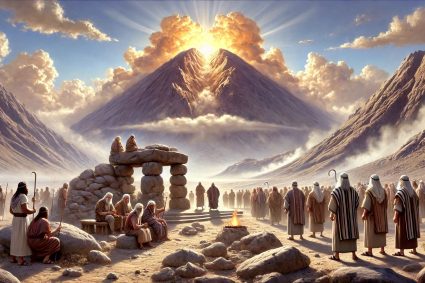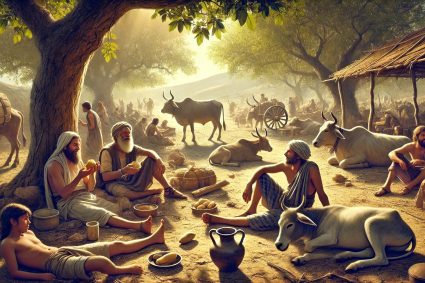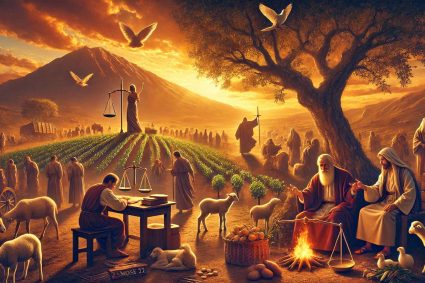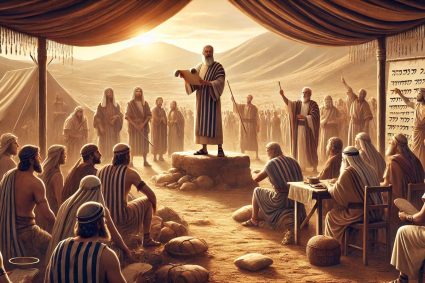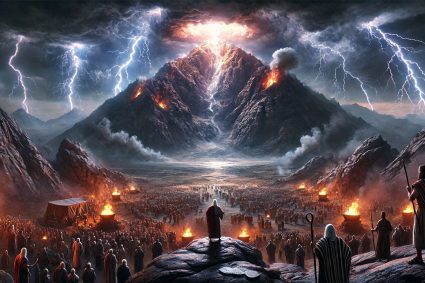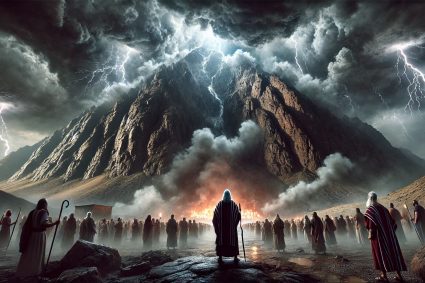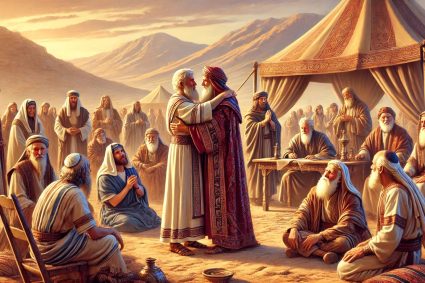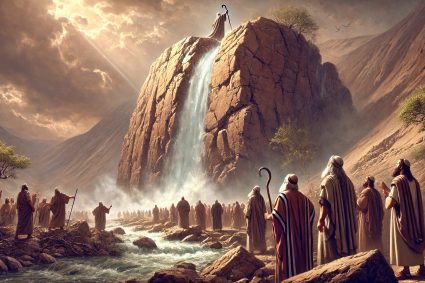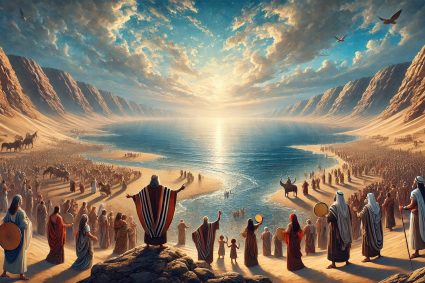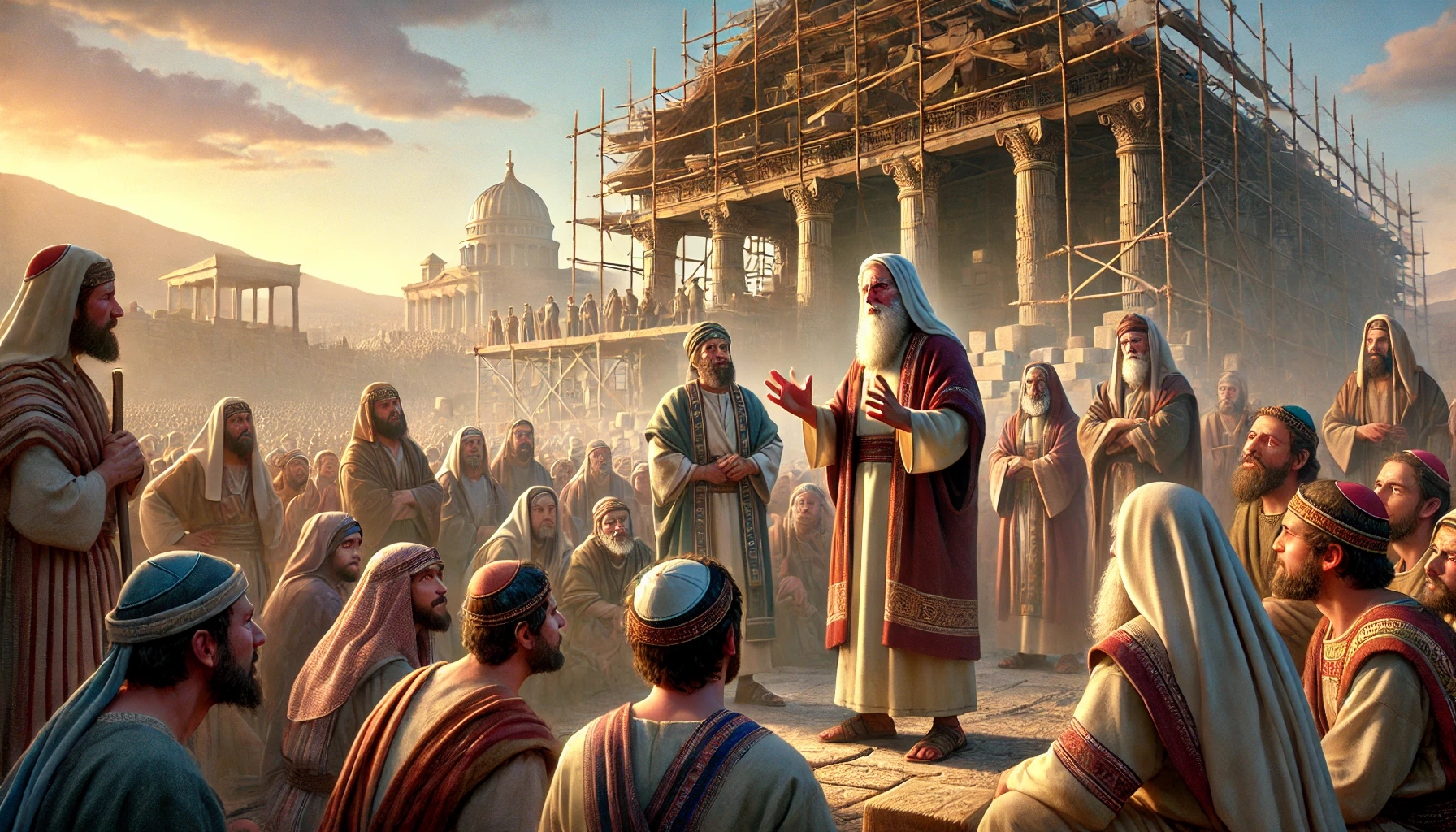
July 12, 2024
DAILY BIBLE READING – Haggai Chapter 2
1 In the seventh month, in the one and twentieth day of the month, came the word of the Lord by the prophet Haggai, saying,
2 Speak now to Zerubbabel the son of Shealtiel, governor of Judah, and to Joshua the son of Josedech, the high priest, and to the residue of the people, saying,
3 Who is left among you that saw this house in her first glory? and how do ye see it now? is it not in your eyes in comparison of it as nothing?
4 Yet now be strong, O Zerubbabel, saith the Lord; and be strong, O Joshua, son of Josedech, the high priest; and be strong, all ye people of the land, saith the Lord, and work: for I am with you, saith the Lord of hosts:
5 According to the word that I covenanted with you when ye came out of Egypt, so my spirit remaineth among you: fear ye not.
6 For thus saith the Lord of hosts; Yet once, it is a little while, and I will shake the heavens, and the earth, and the sea, and the dry land;
7 And I will shake all nations, and the desire of all nations shall come: and I will fill this house with glory, saith the Lord of hosts.
8 The silver is mine, and the gold is mine, saith the Lord of hosts.
9 The glory of this latter house shall be greater than of the former, saith the Lord of hosts: and in this place will I give peace, saith the Lord of hosts.
10 In the four and twentieth day of the ninth month, in the second year of Darius, came the word of the Lord by Haggai the prophet, saying,
11 Thus saith the Lord of hosts; Ask now the priests concerning the law, saying,
12 If one bear holy flesh in the skirt of his garment, and with his skirt do touch bread, or pottage, or wine, or oil, or any meat, shall it be holy? And the priests answered and said, No.
13 Then said Haggai, If one that is unclean by a dead body touch any of these, shall it be unclean? And the priests answered and said, It shall be unclean.
14 Then answered Haggai, and said, So is this people, and so is this nation before me, saith the Lord; and so is every work of their hands; and that which they offer there is unclean.
15 And now, I pray you, consider from this day and upward, from before a stone was laid upon a stone in the temple of the Lord:
16 Since those days were, when one came to an heap of twenty measures, there were but ten: when one came to the pressfat for to draw out fifty vessels out of the press, there were but twenty.
17 I smote you with blasting and with mildew and with hail in all the labours of your hands; yet ye turned not to me, saith the Lord.
18 Consider now from this day and upward, from the four and twentieth day of the ninth month, even from the day that the foundation of the Lord‘s temple was laid, consider it.
19 Is the seed yet in the barn? yea, as yet the vine, and the fig tree, and the pomegranate, and the olive tree, hath not brought forth: from this day will I bless you.
20 And again the word of the Lord came unto Haggai in the four and twentieth day of the month, saying,
21 Speak to Zerubbabel, governor of Judah, saying, I will shake the heavens and the earth;
22 And I will overthrow the throne of kingdoms, and I will destroy the strength of the kingdoms of the heathen; and I will overthrow the chariots, and those that ride in them; and the horses and their riders shall come down, every one by the sword of his brother.
23 In that day, saith the Lord of hosts, will I take thee, O Zerubbabel, my servant, the son of Shealtiel, saith the Lord, and will make thee as a signet: for I have chosen thee, saith the Lord of hosts.
King James Version. Public Domain
Commentary
Introduction
Haggai Chapter 2 is a profound prophecy concerning the rebuilding of the temple and the future glory that will surpass the former. The prophet Haggai speaks to Zerubbabel, the governor of Judah, and Joshua, the high priest, as well as to the entire remaining people. This message is intended to encourage them and to highlight the importance and sanctity of their task.
Verses 1-5: Encouragement and Reminder
At the beginning of the chapter, the Lord, through Haggai, delivers an encouraging message to the leaders and the people. He reminds them that He, the Lord of Hosts, is with them and that they should continue their work on the new temple despite the challenges and its seeming insignificance. This is a powerful reminder of God’s constant presence and His promise made during their exodus from Egypt.
Verses 6-9: Prophecy of Future Glory
In these verses, Haggai prophesies that the new temple will have greater glory than the first. God will shake all nations, and the best of them will come to the temple. This promise is not just about material prosperity but also signifies a deeper spiritual fulfillment, symbolizing peace and divine presence. This prophecy demonstrates God’s sovereignty over all the earth’s riches and His ability to direct the fate of nations.
Verses 10-14: Holiness and Purity
An important lesson about holiness and impurity is conveyed here. Haggai asks the priests questions to show that impurity is transmitted through contact, while holiness is not. This emphasizes the necessity for the people themselves to be pure to perform holy works. The current impurity of the people renders their sacrifices and works impure before God, serving as a call to repentance and purification.
Verses 15-19: Retrospection and Promise
Haggai urges the people to reflect on their situation. He reminds them of how they suffered from drought and scarcity because they had not turned to God. However, from the day the foundation of the temple was laid, God promises them blessings. This promise highlights the direct connection between obedience and divine blessing.
Verses 20-23: Zerubbabel as God’s Signet Ring
In the conclusion of this chapter, the Lord again speaks through Haggai to Zerubbabel, announcing a future upheaval of kingdoms. Zerubbabel is portrayed as God’s chosen servant, held like a signet ring—a symbol of honor, authority, and divine selection. This points to the messianic lineage that continues through Zerubbabel and ultimately culminates in Jesus Christ.
Summary
Haggai Chapter 2 delivers a powerful message of encouragement, hope, and divine promise. It emphasizes the importance of building the temple, not just as a physical structure, but as a symbol of the renewed relationship between God and His people. The prophecies about the temple’s future glory and Zerubbabel’s selection underscore the ongoing divine guidance and God’s plan for His people.
![]()

WEEKLY SPIRIT OF PROPHECY READING – Ellen White | The Desire of Ages Chapter 45: The Foreshadowing of the Cross
This chapter is based on Matthew 16:13-28; Mark 8:27-38; Luke 9:18-27.
Read online here
Commentary
Introduction:
This chapter deals with the profound preparation and awareness of Jesus regarding his impending suffering and death. Based on the Gospels of Matthew, Mark, and Luke, it highlights Jesus’ foreknowledge of his path to the cross and his dedication to fulfilling God’s will.
Jesus’ Awareness of His Suffering:
Jesus was fully aware of the pain and agony that awaited him. Even before his incarnation, he had foreseen the entire path of suffering. Despite knowing the impending torments, insults, and deprivations, he chose to walk this path out of love for humanity. His willingness to fulfill God’s will demonstrates his deep dedication and obedience to the Father.
The Significance of the Cross:
The cross is a central symbol in this chapter. Jesus saw it not only as an instrument of his suffering but also as a means of redeeming humanity. Despite the impending pain, he was encouraged by the prospect of human salvation. His suffering and death were meant to bring people back to faithfulness to God.
Preparation of the Disciples:
Jesus prepared his disciples for the upcoming events. He knew they would witness his crucifixion and death and wanted to strengthen them. In a city near Caesarea Philippi, far from the influence of the Jews, he spoke with them about their faith and reaffirmed their conviction that he was the Messiah.
Peter’s Confession:
Peter confessed that Jesus was the Christ, the Son of the living God. Jesus praised him for this and explained that this revelation did not come from human wisdom but through divine inspiration. This recognition formed the foundation of the disciples’ faith and the future Church.
The Announcement of Jesus’ Suffering:
For the first time, Jesus spoke openly about his impending suffering and death. This announcement deeply shocked the disciples, as they were still hoping for an earthly kingdom. Peter’s attempt to dissuade Jesus was sharply rebuked by Jesus, as he misunderstood the divine mission.
The Concept of Self-Denial:
Jesus explained to his disciples the necessity of self-denial and taking up the cross. This meant denying one’s own self and being willing to endure suffering for the sake of Christ. This message was and still is a central teaching of the Christian faith.
Encouragement through the Promise:
Jesus encouraged his disciples with the promise of his coming kingdom in glory. Although they did not fully grasp the depth of his words, he gave them hope that they would ultimately see his glory.
Conclusion:
Chapter 45 shows the profound preparation and awareness of Jesus regarding his suffering and his dedication to fulfilling God’s will. It emphasizes the necessity of self-denial and taking up the cross for every follower of Christ. The disciples were prepared for the coming trials while Jesus simultaneously encouraged them with the hope of his ultimate glory. These teachings remain relevant today and inspire believers to remain steadfast in their faith and follow Jesus.

WEEKLY SPIRIT OF PROPHECY READING – Ellen White | The Desire of Ages Chapter 46: He Was Transfigured
This chapter is based on Matthew 17:1-8; Mark 9:2-8; Luke 9:28-36.
Read online here
Commentary
Introduction:
Chapter 46 describes the Transfiguration of Jesus, based on accounts from the Gospels of Matthew, Mark, and Luke. This episode reveals a significant disclosure of Jesus’ divine nature and provides the disciples with a brief glimpse of heavenly glory.
The Ascent on the Mountain:
Jesus takes Peter, James, and John with him to a secluded mountain. Although they are exhausted, the disciples follow their Master into the evening hours. The darkness enveloping the mountain symbolizes the sorrow and trials that Jesus and his disciples will soon face.
Jesus’ Prayer:
Jesus moves a short distance from the disciples to bring his concerns and needs before the heavenly Father in prayer. He asks for strength to endure the forthcoming suffering and for a revelation of his glory to strengthen the disciples’ faith. Despite their efforts to stay awake, the disciples are overcome with fatigue and fall asleep.
The Transfiguration:
While Jesus prays, the heavens open, and a holy radiance envelops him. The divine within him shines through his human form, and his appearance becomes as bright as the sun. Moses and Elijah appear and converse with Jesus about his impending death in Jerusalem.
Significance of Moses and Elijah:
Moses represents those who will be resurrected at Christ’s return, while Elijah represents those who will be transformed without experiencing death at Christ’s return. Their presence confirms Jesus’ divinity and the fulfillment of Old Testament prophecies.
The Disciples’ Reaction:
The disciples awaken and are overwhelmed by the heavenly glory. In his enthusiasm, Peter suggests building three shelters to preserve this moment. However, the significance of the Transfiguration lies not in earthly reign but in the confirmation of Jesus’ divine mission, which must pass through the cross.
God’s Voice:
A bright cloud overshadows them, and God’s voice declares, “This is my beloved Son, with whom I am well pleased; listen to him.” The disciples fall to the ground in fear until Jesus calms them and helps them up. This experience strengthens their faith and gives them a deeper understanding of Jesus’ identity and mission.
Conclusion:
The Transfiguration is a significant revelation of Jesus’ divine nature and serves to strengthen the disciples’ faith and prepare them for the upcoming sufferings. It shows that Jesus is indeed the Messiah foretold by the prophets and that his suffering and death are part of the divine plan of redemption. The Transfiguration gives the disciples a foretaste of future glory and confirms that Jesus is the Son of God, whom they are to follow.
(Visited 12 times, 1 visits today)

